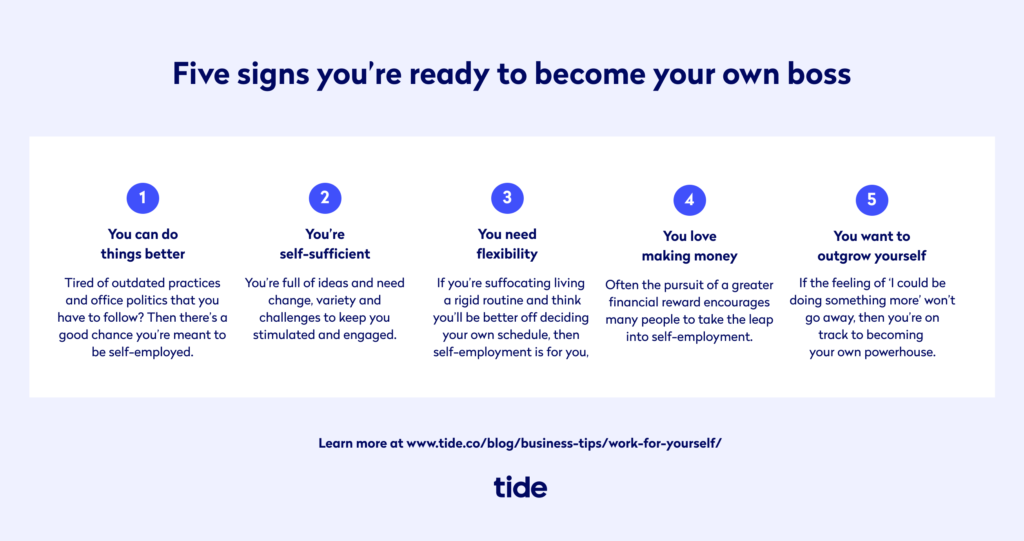
How to work for yourself: a complete guide

Are you interested in working for yourself, but you don’t know what to do or where to start?
Look no further.
At Tide, we offer everything you need to get your business up and running, so you can start working for yourself hassle-free.
With 4.4 million self-employed workers in the UK and steady growth year on year (despite the pandemic), working for yourself has become very popular. Many individuals prefer to be their own boss, choose their own hours and enjoy the financial benefits that come with self-employment.
If you’re reading this, you’re likely ready to take the leap to become an entrepreneur, freelancer, gig economy worker, or contractor and need some guidance on how to get started.
In this article, we’ll outline the benefits of working for yourself, the factors you should consider before jumping in, and tips on how to make the most of the freedom and opportunities it affords.
Table of contents
- What are the benefits of working for yourself?
- Five signs you’re ready to be self-employed
- Things to consider before working for yourself
- Types of self-employed businesses
- How to be productive when working for yourself
- Wrapping up
What are the benefits of working for yourself?
You may choose to work for yourself because you have a vision for something greater, and want to build something you’re proud of.
Alternatively, you might identify a pain point or spot a gap in the market that you feel eager and motivated to fill.
Whatever your motivation, here are some benefits to convince you that you’ve chosen the right path.
1. You’ll make more money
Once you work for yourself, you’ll find that your earning potential is higher and you’re spending less money on certain things.
No more commuting expenses or expensive lunch bills. You can also claim some of your household bills as expenses to reduce your tax bill such as internet, electricity and phone bills.
It can take some time to gain traction with a new product or service. But once you’ve validated your offering and found a message that resonates with your market, the growth opportunities can be endless.
Top Tip: The best way to set yourself up for success is to understand your target audience – what motivates them to make purchases? Where do they find new information about brands and engage with them? To learn how to do this, read our guide to building an effective go-to-market strategy. 🚀
2. You’re your own boss
Being self-employed means that you have the freedom to run your business how you see fit.
From having the final say on business decisions, to choosing your work location and setting your own hours, you’re in control.
This can lead to higher job satisfaction and an improved quality of life – what’s not to love about that?
3. You’ll have creative freedom
Because you’re in charge of your own workload, you’ll have the chance to work on projects you’re passionate about, whilst learning some new skills along the way.
Setting up a business alone can make you proficient in a number of different areas – from administrative tasks, to managing your business finances and self-employed taxes.
Embracing these tasks will contribute to your growth as a seasoned business owner.
Five signs you’re ready to be self-employed
You’re currently in investigation mode. Weighing the pros and cons of going at it solo or keeping your full-time or part-time job.
Many people who contemplate becoming self-employed don’t know what to do and need time to get their heads together to come up with a viable launch plan.
It’s also likely you’re looking for validation. Someone to tell you that you’re meant to be working for yourself. Here are five signs that may resonate with you:

1. You can do things better
Tired of outdated practices and office politics that you have to follow? Then there’s a good chance you’re meant to be self-employed.
Entrepreneurs don’t usually like taking orders and are obsessed with doing things efficiently and competently. To work for yourself is to get the job done on your own terms without worrying about a manager holding your growth back or cramping your work style.
2. You’re self-sufficient
You’re full of ideas and need change, variety and challenges to keep you stimulated and engaged. Otherwise, you feel demotivated and switched off.
If you’re resourceful and know how to get things done without asking permission or someone holding your hand, then working for yourself should be your reality.
3. You need flexibility
If you’re suffocating living a rigid routine, with set working hours and think you’ll be better off deciding your own schedule, then self-employment is for you.
Whilst flexibility within your day is a perk of working for yourself, business owners don’t necessarily work fewer hours. Often, it’s the opposite but they get to choose to do their job when it suits them.
4. You enjoy making money
Often the pursuit of a greater financial reward encourages many people to take the leap into self-employment.
Let’s not forget: many traditional jobs don’t reward overtime. Becoming self-employed not only gives you a real opportunity to control your own financial future but your extra effort might actually pay off.
5. You want to strive to be your best self
Do you play around with business ideas in your spare time and watch entrepreneurial videos on YouTube?
Are you thinking about quitting your job to start building an empire of your very own?
If the feeling of ‘I could be doing something more’ won’t go away, then you’re on track to becoming your own powerhouse.
Things to consider before working for yourself
Before entering into self-employment, you want to make sure you’ve covered all bases – from writing a solid business plan to funding your business and paying your taxes.
Let’s take a look at these elements in more detail.
Writing a business plan
If you want to work for yourself, the best place to start is to create a well-structured, professional business plan that you can present to others, as a means to get funding.
They’re also helpful in presenting your long and short-term business objectives, alongside other ideas.
As you’ll most likely be showing this to potential investors and/or banks, you want to make sure your business plan contains all of the relevant information. It’s important to be realistic and transparent about costs.
Unsure on how to go about this? We’ve got you covered in our guide on writing your first business plan.💡
Making a budget
To get your business up and running, you’ll need to put together a financial plan that includes all of your costs. These costs can be large or small depending on the type of business you’re running.
Here are some costs to consider when creating your budget:
- Incorporating and registering your business
- Business premises rental including utilities (electricity, internet etc.)
- Equipment such as computers, office furniture and phones
- Buying a domain and creating a website
- Marketing and advertising
- Employees (if required)
Once you’ve decided how much you can personally invest in your business, you can start looking at other finance options like business loans, investors, crowdfunding and more.
At Tide, we offer a range of business loans, plus you can find out how much you’ll need to borrow using our Business Loan Calculator.
We work with our funding partners to provide businesses access to over 120 trusted lenders, ensuring you get the business loan that’s just right.
Top Tip: If you need further guidance on how to make a budget, our guide on creating an effective business budget will take you through it step-by-step.
Paying taxes (Self Assessment)
Setting up your own business means that you’ll need to register for Self Assessment, so you can pay and declare your own taxes.
This part of being self-employed can be particularly overwhelming, especially if it’s your first time going it alone and you don’t have an accountant to help manage your finances.
Luckily at Tide, we’ve already thought about this!
Once you open your free business bank account, you can access a suite of tools that will help you manage your business finances at ease. Access built-in Tide Accounting software or connect your own for seamless bookkeeping.
Assign simple expense categories to transactions and upload receipts in real-time to keep track of your expenses. We’ll give you automated estimates of your turnover and expenses so you can submit your Self Assessment to HMRC hassle-free.
Top Tip: We have a dedicated blog that runs you through all of the tax year dates so you don’t miss any deadlines. You can also check out our Self Assessment guide which has everything you need to know about paying your taxes when you work for yourself.
Types of self-employed businesses
There are various business structures to consider when you become self-employed. You can choose to be a sole trader, limited company, or in a partnership.
The unique needs of your business will help you determine which is right for you – but if you’re unsure, you can read more in our article that maps out the differences between a sole trader and a limited company.
Many business ideas already exist in the world and it can be difficult to come up with the right one to focus on. Especially if you’re looking for business ideas with low startup costs, such as launching an e-commerce store, consulting, graphic design and more.
If you’re setting up more of a “side hustle”, we’ve written an article on some of the best side hustles to start.
How to be productive when working for yourself
Working for yourself can be the best thing on earth. For many of us, it’s a luxury we dream of, until we become our own worst enemy.
You don’t feel the social pressures or obligations to get things done and the pressures to work a normal workday, in the traditional sense, are certainly lessened.
Performance matters especially when you work for yourself, so don’t fall into this trap. How can you stay productive, and live up to all of the expectations that you’ve set for yourself?
Structure your day
Segment what you’ll do and when over the course of the day. Add time windows to your calendar as a mental safeguard of your time. This way, you’ll be more efficient and will have a target of completing specific tasks each day.
Set boundaries and share your calendar
Share your calendar to set boundaries with friends and family, and sprinkle some breaks in to have a quick catch up with them. Similarly with clients, if you don’t work on Sundays, don’t respond to emails. Otherwise, your clients will believe you’re available 24/7.
Stay active and healthy
When you work for yourself, you may not have to commute, walk to the train station or even to your car. Make sure to develop healthy habits to find balance. Take a break, go outside and find reasons to get on your feet.
Choose and invest in a dedicated work space
Dedicate a specific room or corner in your home or wherever you choose to work. Invest in a laptop, phone and an ergonomic chair. Whatever you need to not waste time, be comfortable and productive.
Turn off notifications
Doing this will greatly improve your ability to focus. Chances are you won’t miss anything while you actually get your tasks completed. If you’re struggling with this, use your browser’s incognito window when surfing the web to make sure you’re logged out of all accounts.
Create a routine (and stick to it!)
When you work for yourself, it’s easy to get carried away and work overtime, which can cause burnout. Create a routine that suits you and stick by it – when you wake up, it’s go-time. Get up, clean up, fuel up and start rolling. Keeping a tidy workspace will also help you to be more productive.
Wrapping up
The fulfilment and satisfaction you experience from getting to work for yourself is truly something that is hard to match. It’s something you have to experience to fully understand.
If your goal is to set out on your own, start building your business and working for yourself, then it’s vital to keep your business records and finances separate from your personal affairs.
At Tide, we make it easy for you to start your business.
You can see if your business name is available using our Company Name Check tool, and then register your company through us. We’ll even provide you with a free business bank account and equip you with the tools needed to run your business like a pro.
To learn more about getting your business up and running, you can read our guide on how to start a business in the UK🚀






